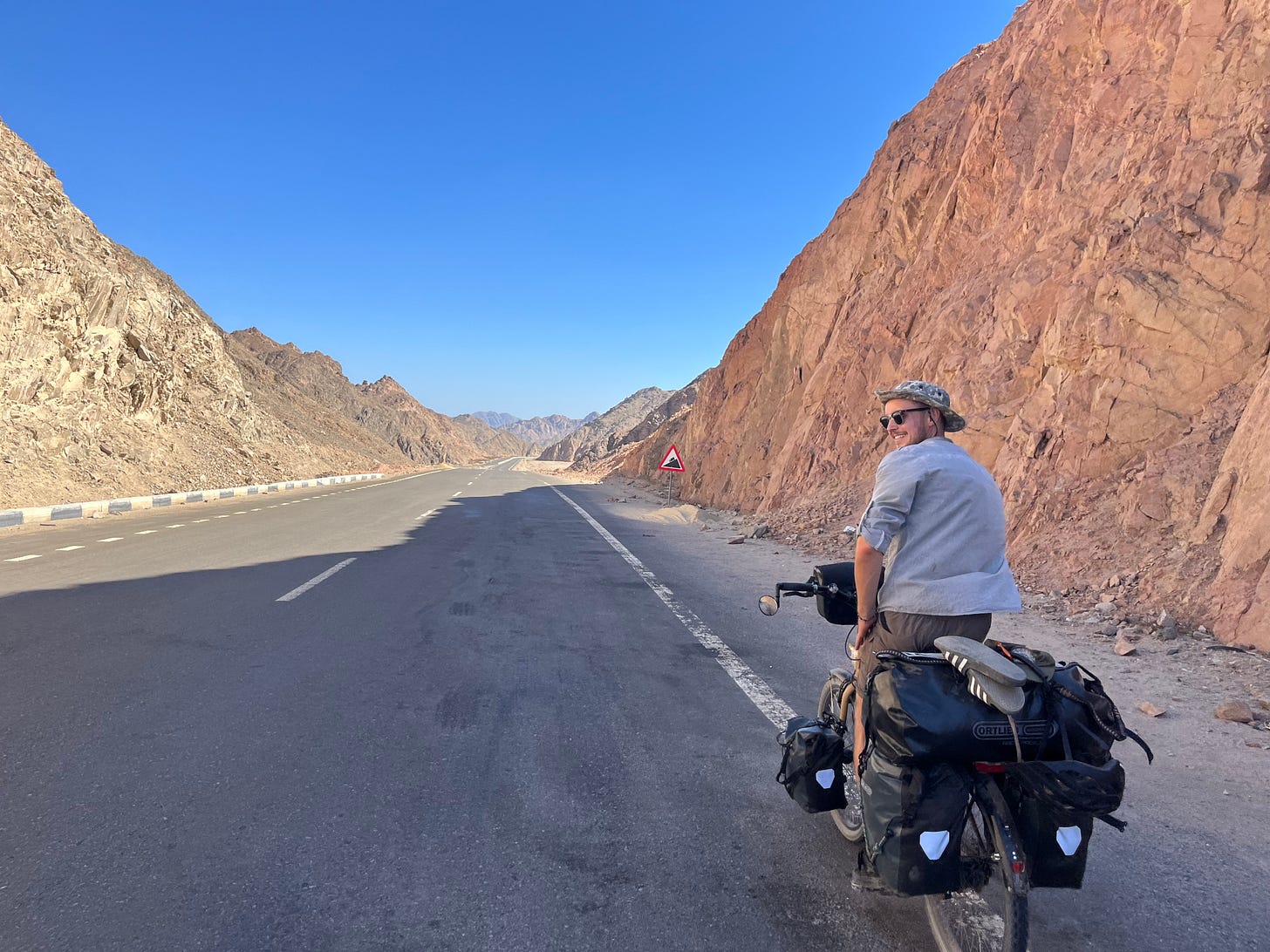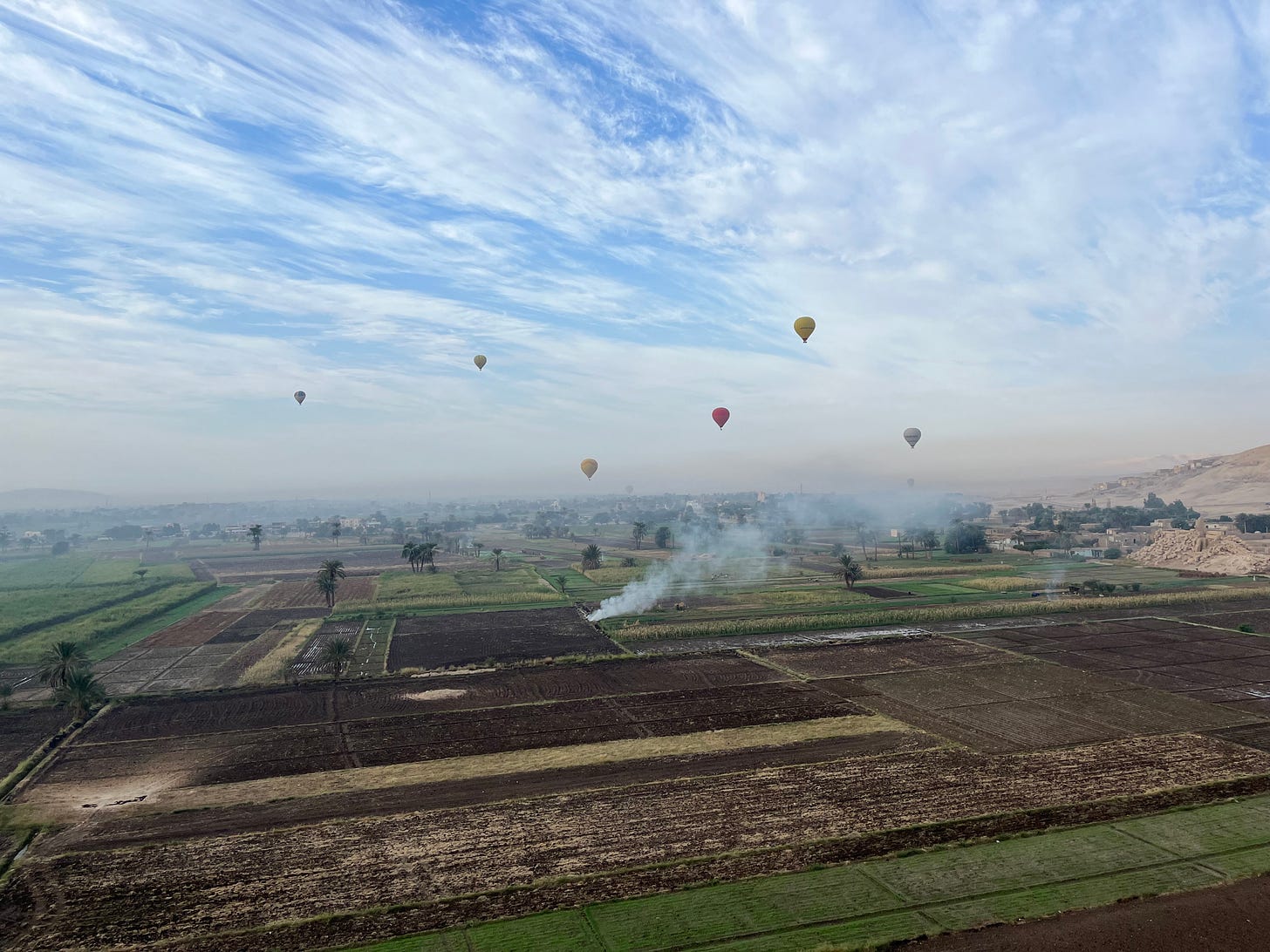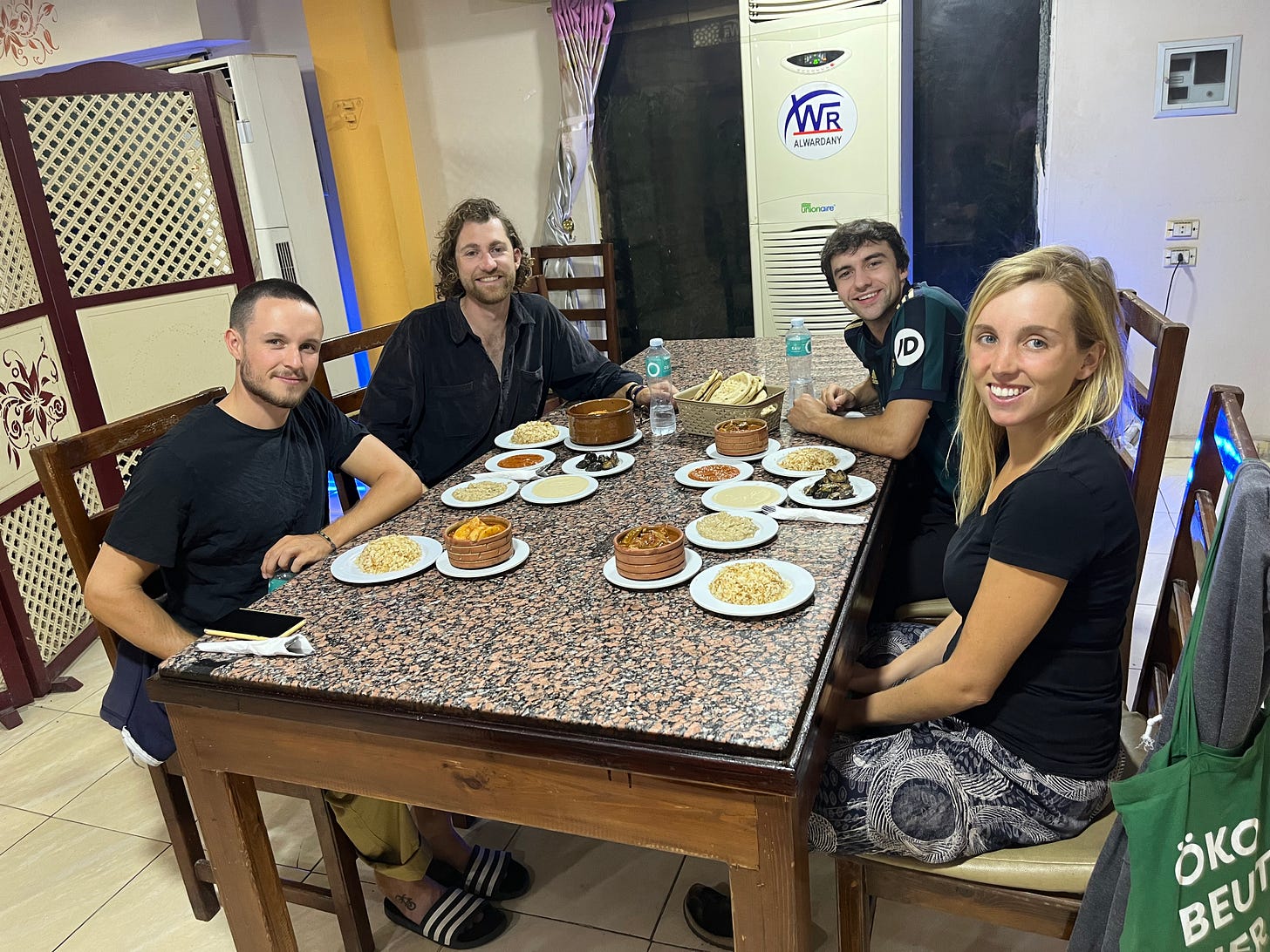#161 | The third hour
Safaga Port, Egypt | How and why our phones get in the way of our lives.
Today I am writing from aboard the Daleela, a very big ferry. We sit on the edge of the Red Sea; Safaga Port is west, across the gangway. We boarded at 4 p.m. The boat will sail at 1 or 2 a.m. Thirteen hours slow sailing east, across the mirror-like sea, is Duba, our destination.
Saudi Arabia will be beautiful. Egypt was. I realise I am endlessly lucky to now enjoy one of my life's most memorable chapters. I don't want to miss a second. While I hope that life continues on this exciting, adventurous tack for another seven decades, it's unlikely that I'll again be sipping chai in the Daleela with my loaded bicycle on the lower deck. Moreover, I feel — in a circular way — especially fortunate to write to you about how lucky I feel. But lots of us are missing lots of our lives by being distracted. Phones are to blame. This week, I want to explore how we rarely give anything three or more hours of undivided attention, yet we get creative only after three hours.
Let me quickly describe this sea-born canteen: the stilled engines shake from fifty feet beneath me; I look across thirty empty beige wooden chairs beside fifteen laminated tables to three groups of men — all truck drivers — sipping Sprite and Coca-Cola, eating steamed vegetables, mystery meat stew and rice. When I walked into the cafeteria, Ahmed, the bartender about my age, stared, smirked, laughed, and said, "What are you doing here?!" A great question: I ordered chai.
It's these times — the extraordinary ones — that we don't want to slip away. They always do, however. When I think back to a memory, it feels ephemeral and intangible: impossible to grasp and hold, like a blur or, more precisely, like a dream. I have to squint for detail, but are the details imagined? Even looking at a photograph of myself taken as recently as this morning, I am surprised it's me in the picture (it certainly doesn't feel like who I am now); it's a poor and incomplete version of me, often not as flattering as I wish. My iPhone feeds me On This Day, but I look at a stranger every day: was I that man living that life?! I believe everyone feels this.
Correspondingly, everything we want to obtain in the future will eventually end up as the same intangible memory. Our future will be annihilated by the present and passed quickly into the past. I feel existential when I consider how quickly we all get pulled forward, from future to present to past, snatching a glimpse of it (whatever it is) in the interim.
This interim — the bit between the future and the past — is where we are. It's the only place we hang out. Because the past is intangible and empty, dwelling on it does no good. Because the future will also irresistibly become "has been", we also shouldn't get too excited about it. So, we are left in the present. The eternal now, as Alan Watts calls it. Emerson's essay on "Self Reliance" describes the rose in the present,
'These roses under my window make no reference to former roses or to better ones; they are what they are, they exist with God today. There is no time for them. There is simply the rose; it is perfect in every moment of its existence. But man postpones or remembers; he does not live in the present, but with reverted eye laments the past, or, heedless of the riches that surround him, stands on tiptoe to foresee the future. He cannot be happy and strong until he too lives with nature in the present, above time.'
Emerson's 'present, above time' is getting harder to reach. Our phones are doing a fine job of robbing us of its quiet. Rather than just being totally in the room, on the cushion — allowing our mind to wander in some healthy or unhealthy direction — we are persistently distracted by (and called into) a five-inch glowing screen which hides the present moment from us. It corrupts the joy of just being here, while subversively monetising our attention. Grim.
It gets worse: first, we're tricked into believing that in some way we are productive, quickly responding to an email, sharing an update or half-reading a blog post. Second, we believe we are benefitting from human connection. This is not true when considered. Imagine (quickly, I think) two people messaging on WhatsApp: could there be a less natural interaction, a less organic and 'human' connection? We find two beautiful individuals — animals, essentially — yawing into two glowing screens, feeding weak representations of themselves through a minimal medium, either a text or a selfie, both up-lit by the blue light and blinkered to the world flashing in rich wonder.
Our lives are vanishingly short. 'Carpe Diem'. To spend twenty-five per cent of our waking hours (or more) blinkered to the world, fed information in sans serif font blinked by marching LEDs, is not fulfilling. I hesitate to get too detailed, but even switching apps has been designed to entertain; isn't refreshing our emails somehow satisfying? I pull down the inbox, see the dial spin (presumably, the cog means work happens) and wait for emails to appear. Ah, I see there are none; change the app and repeat.[1]
We mindlessly switch and scroll and burn through the time we have and drag the future into the past, totally missing the wonderful step in between.
I stopped posting on Instagram [2] and decided to commit to writing to spend more time in the present. When writing, the writer observes feelings, surroundings and interactions. If the Red Sea were the future and the Egyptian desert the past, the writer sits in port, aware of both but focussed — while writing, at least — on the present. The musician and artist could say the same. The act of mindful creation requires the present moment. The construct of time breaks up when absorbed. Would I have noticed Ahmed's crisp, ironed white uniform if I had not been writing? Or the faux-marble wall, grey, that's peeling in the top right, or the engine gently warming itself?
So, a prediction: We'll wake up and realise, "shit, we're missing out on our lives by sharing it on our phones". With a fright, we'll admit we've let an unhealthy proportion of our lives slip out of reach — and there is no going back. What will your lifetime screen time be? Fifteen years? How else could you have spent that time?
Not only do we miss out on the world (as if blinkered on the race track) when focused on our phones, but there is an opportunity cost. The opportunity cost is never reaching what I call "the third hour". That is the third hour of complete focus and blissful un-distraction. It applies to conversation as well as to art. It applies to walking, reading, and meditating. And using our phones, TV, and social media stops us from reaching the third hour. It seems that people — we — will do anything not to dedicate our attention to something for three hours. But why is the third hour critical?
In conversation, 'the third hour' is when the insights drip like rain in a deep conversation; when the niceties are finished, the boring questions are asked and politely concluded. It's when we venture into conversational risks and get out of the shallows.
But reaching this third hour without distraction is rare. For aeons, we'd sit under the stars, late, without distraction or notification, and wonder, ponder, hear our pondering back, then unpack and challenge it. Imagine the conversations were never captured!
And at the foot of the mountain of distraction, I blame our phones. And then I blame us, for we are responsible for our relationship with our phones. We are tragically, avoidably, unrepentantly distracted. We never, because of our addiction to faux-connection, reach the third hour; we never let the world wash by and observe it doing its washing. [3] Phones act as an escape hatch from deep, and often vulnerable, conversation; they give the illusion of bringing you together, but they are actually keeping you apart.
This week, I spent hours with the Egyptian police. They ostensibly want to keep us safe and achieve this goal by making us wait. An Egyptian minute, Egyptians will tell you, takes half an hour. Tellingly, they have a hand signal to indicate "wait" — four fingers and then thumb held together pointed up. We waited, but our Western European impatience took charge after not so long, and we slipped away. One evening, we hid behind a dune in the desert, one hundred kilometres from the nearest village — where the stars appear so brightly the rocky dunes glow. You could erect your tent under the luminous Milky Way at midnight. Alone — without signal nor distraction, and in the absence of light to stay invisible — we sat and had an elusive three-hour conversation. It made me think: when was the last time I was without the distraction of technology, without the persistent notification of the unimportant, the buzz of everything that can wait?
The final beauty of 'the third hour' is that it can't be rushed into or hurried. I'm reminded of Milan Kundera's description of novels. It applies to this sense of getting to a conclusion, to a publishable result, as quickly as possible.
"Do you think that everything that is not a mad chase after a final resolution is a bore? As you eat this wonderful duck, are you bored? Are you rushing towards a goal? On the contrary, you want the duck to enter into you as slowly as possible and you never want its taste to end. A novel shouldn't be like a bicycle race but a feast of many courses."
The first hour or two may not be as fruitful as we hope, but that's okay, and we can enjoy them without rushing. They are necessary foothills to cross. So don't let another day go by without spending an undistracted hour with the people you love: turn off your phone for an hour or more and ask them, 'How are you?' Do it now.
*
Live well
Hector
*
[1] When designing the Macintosh, Steve Jobs wanted it to boot up in record time. When told it was impossible, he calculated the amount of time, and consequently, the aggregate years of life, spent if there were hundreds of thousands of computers in North America. I wonder now how many hours — and in aggregate lives — are spent watching Mail refresh?
[2] When briefly on Insta, I found that I would look at the world as an Instagram shot, not as it is. We apply an Insta filter to our real lives. This is distorting. Plus, there's a high chance Insta won't be around in a decade.
[3] I wrote about this a month ago (Never Alone With A Phone). Still, I did not realise at that stage the extent of the damage phones are doing to us: it's one thing missing a bit of serendipity — the point of the previous missive — it's entirely another being robbed of all of the depth we can have because we're persistently, and artificially, distracted. We can point to the heinous tragedy of road accidents that rob people of their lives, but will we soon be saying the same about our phones? To my mind, the logic is consistent though less violent.





